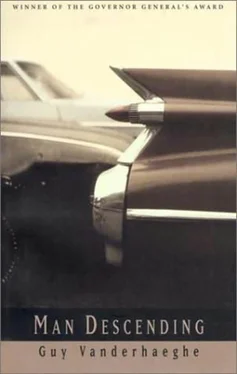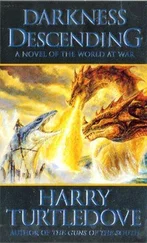“Don’t you listen, Uncle Carl,” he muttered fiercely. “Don’t you listen to him.”
Through the keyhole the boy could see only part of the room, and that part contained Tollefson’s bed, by which the old man knelt praying, his bare back turned to the door, and the scar, faded by time, a faint letter formed by a timid hand.
What was out of view, in that portion of the bedroom that contained the unseen wardrobe, toward which Tollefson’s head was beseechingly turned, Little Paul could only imagine.
The old man and the boy picked their way between the dusty rows of garden vegetables under a stunning August sun, collecting refuse for the pigs. Little Paul trudged along listlessly behind Tollefson, pulling a wagon heaped with old pea vines; tiny, sun-scalded potatoes; beet and carrot tops. Their two shadows, black as pitch, crept over the dry, crumbling soil; shattered on the plant tops shaking in the breeze; squatted, stooped, and stretched.
Tollefson was admitting to himself he was a sinful man, a deceitful man. For months, ever since the April storm in which he had collapsed, he had known he was incapable of any longer earning his way in the world. His working days were over. He really was an old man, and in his talks with God he had come to realize that he was close to death. Yet he had pretended it was only a matter of time before he regained his strength and left to find work. But this deception was no longer enough. His niece and her husband were becoming impatient with him. Perhaps they would soon invite him to leave.
Tollefson didn’t want to leave. He was an old man with nowhere to go. A man with no place of his own; no people of his own. All his life he had lived in other men’s houses; played with other men’s children; even, on occasion, slept with other men’s wives before he had come to know Jesus. He was lonely and frightened.
That was why he had hit on the idea of making Little Paul the beneficiary of his will. He had worked very hard all his life and saved more money than anybody would suspect. Thirty-nine thousand dollars. When he told Lydia what he was going to do, they wouldn’t dare ask him to leave for fear he would take the boy out of his will. What had Jesus said? “ Or what man is there of you, whom if his son ask bread, will he give him a stone? Or if he ask a fish, will he give him a serpent?”
Big Paul might hate his guts, but he wouldn’t deny his son a stake in thirty-nine thousand dollars. He was sure of that.
Tollefson looked down at Paul grubbing under a tomato plant for wormy fruit. Lydia had told him the child was suffering from bad dreams and nervous diarrhea.
The boy glanced up at him with his flat, guarded eyes. “Tomorrow will be too hot to kill pigs,” he said out of the blue. Although Little Paul hadn’t phrased his sentence as a question, Tollefson knew it was. For a week the boy had heard his father and Tollefson discuss whether they would soon have “killing weather” – cooler temperatures and a wind to prevent flies swarming on the pigs as they were scalded and gutted.
“Can’t wait any longer,” said Tollefson matter-of-factly, shading his eyes and studying the glowing blue glaze of the sky. “Your dad made a booking to have the meat cut and wrapped at the locker plant tomorrow afternoon. I’ll have to do the pigs in the morning.” The old man paused, adjusted his shirt sleeves, and then inquired, “Are you going to give me a hand?”
“It’s too hot to kill pigs,” the boy said sullenly.
“You got to learn some time,” Tollefson said, “if you want to be a farmer. I told you all along them pigs would be butchered, and your mother told you. You knew it. That’s a farmer’s job to grow things for people to eat. Now, you like bacon, don’t you? Where do you think bacon comes from?”
“God,” said Little Paul automatically. He thought he’d learned how to please Tollefson.
His answer took the old man momentarily aback. “Well yes… that’s right. But pigs is what I meant. It comes from pigs. It’s pork. But you’re right. Everything God made, he made for a reason. He made pigs for men to eat.”
“I’d puke,” said Little Paul vehemently. “I’d puke it all up.”
Tollefson took off his long-billed cap and peered into it as if he expected to find there an answer to his predicament. “Listen,” he said at last, taking the boy by the shoulders and looking directly into his face, “you got to learn to see things through. Believe me when I tell you it’s the most important thing in life. You can’t feed a pig and keep a pig and grow a pig and then leave the end, the dirty part, for another man to do. You had the fun of it all, and now you don’t want the rest. It isn’t right, Little Paul,” he said. “You got to learn that. Remember when I read you the story of Abraham and Isaac? You didn’t want to hear the end of the story because you thought it didn’t suit. Just the way now you think butchering those pigs doesn’t suit. But it does. There’s nothing finer in God’s eyes than a farmer, because the work he does, it does good for all people. A farmer feeds people and that’s good. Don’t you see?” he pleaded to the pale, intractable face.
“No.” The boy’s shoulders twisted under his hand. “No.”
“God wants them pigs butchered,” said Tollefson, trying to make sense of it for the boy. “They won’t feel nothing. I’m a top-notch pig shot. I shot hundreds.”
“You talk to him,” said the boy, speaking very quickly, his face a strained mask. “You two got secrets from me. I talk and talk but he doesn’t answer me what you got planned for me. I asked and asked and asked. But it’s a secret. Why don’t he tell me!”
“Who?” said Tollefson, reaching for the boy, alarmed by the fear which had lain in the shallows of the child’s eyes all those months, but which he recognized only then, for the first time.
“Is he hungry?” implored Little Paul. “Is he hungry? Please, is that how the story ends?”
What I Learned From Caesar
THE OLDEST story is the story of flight, the search for greener pastures. But the pastures we flee, no matter how brown and blighted – these travel with us; they can’t be escaped.
My father was an immigrant. You would think this no penalty in a nation of immigrants, but even his carefully nurtured, precisely colloquial English didn’t spare him much pain. Nor did his marriage to a woman of British stock (as we called it then, before the vicious-sounding acronym Wasp came into use). That marriage should have paid him a dividend of respectability, but it only served to make her suspect in marrying him.
My father was a lonely man, a stranger who made matters worse by pretending he wasn’t. It’s true that he was familiar enough with his adopted terrain, more familiar than most because he was a salesman. Yet he was never really of it, no matter how much he might wish otherwise. I only began to understand what had happened to him when I, in my turn, left for greener pastures, heading east. I didn’t go so far, not nearly so far as he had. But I also learned that there is a price to be paid. Mine was a trivial one, a feeling of mild unease. At odd moments I betrayed myself and my beginnings; I knew that I lacked the genuine ring of a local. And I had never even left my own country.
Occasionally I return to the small Saskatchewan town near the Manitoba border where I grew up. To the unpractised eye of an easterner the countryside around that town might appear undifferentiated and monotonous, part and parcel of that great swath of prairie that vacationers drive through, pitying its inhabitants and deploring its restrooms, intent only on leaving it all behind as quickly as possible. But it is just here that the prairie verges on parkland, breaking into rolling swells of land, and here, too, that it becomes a little greener and easier on the eye. There is still more sky than any country is entitled to, and it teases the traveller into believing he can never escape it or find shelter under it. But if your attention wanders from that hypnotic expanse of blue and the high clouds drifting in it, the land becomes more comfortable as prospects shorten, and the mind rests easier on attenuated distances. There is cropland: fields of rye, oats, barley, and wheat; flat, glassy sloughs shining like mirrors in the sun; a solitary clump of trembling poplar; a bluff that gently climbs to nudge the sky.
Читать дальше












